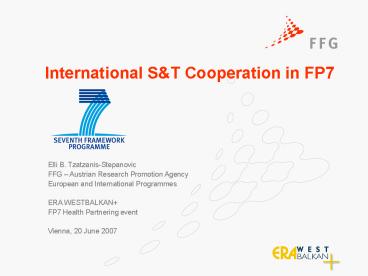International S - PowerPoint PPT Presentation
1 / 13
Title:
International S
Description:
List of International Co-operation Partner Countries (ICPC) downloadable under ... the opening up of the European Research Area to the Western Balkan Countries ... – PowerPoint PPT presentation
Number of Views:23
Avg rating:3.0/5.0
Title: International S
1
- International ST Cooperation in FP7
Elli B. Tzatzanis-Stepanovic FFG Austrian
Research Promotion Agency European and
International Programmes ERA WESTBALKAN FP7
Health Partnering event Vienna, 20 June 2007
2
International ST cooperation in FP7
The international dimension is no longer limited
to a specific scientific and technological (ST)
cooperation programme but is now integrated in
all European Community research activities. This
international policy has three objectives to
support European competitiveness through
strategic partnerships with third countries in
selected fields of science and engaging the best
third country scientists to work in and with
Europe, to facilitate access to research
environments (i.e. universities, research
institutions and firms) outside Europe and
promoting synergies on a global scale, to address
specific problems third countries face or that
have a global character (on the basis of mutual
interest and mutual benefit).
3
International ST cooperation in FP7
Participation is open to international
organisations and legal entities established in
third countries after the minimum conditions laid
down in the Rules for participation have been
met, as well as any conditions specified in the
specific programmes or relevant work
programmes. Organisations from an international
cooperation partner country (ICPC) can also
receive funding. An ICPC is a third country
classified by the European Commission as a
low-income, lower-middle-income or
upper-middle-income country and which is
identified as such in the work programmes.
4
International ST cooperation in
FP7 Cooperation Programme
- Theme-oriented international cooperation actions
are carried out - All ten Themes have an important international
dimension, with international collaborative
research being supported in two ways - Thematic areas open to all third countries
including dedicated actions and coordinated calls
with third countries - NEW Specific International Cooperation Actions
(SICAs) geared towards the research and
development needs of third countries - They have a special minimum consortium
requirement of 4 participants independent of each
other, 2 in the EU or Associated Countries (AC)
and 2 in the target region, i.e. International
Cooperation Partner Countries - (ICPCs)
5
International ST cooperation in
FP7 Cooperation Programme
- Associated countries (same conditions as for
Member States) - 2. International Cooperation Partner Countries
(ICPCs) are defined as the countries that are
classified as low or middle-income third
countries - Countries neighbouring the EU (Western Balkans,
Mediterranean Partner Countries, Eastern European
and Central Asian Countries) - Developing countries (Africa-Caribbean-Pacific,
Asia, Latin America) - Emerging economies (e.g. Brazil, China, India,
Russia, South Africa) - 3. Industrialised countries (USA, Canada, Japan,
Australia)
6
International ST cooperation with
ICPCs Cooperation Programme
- Third country participants on the list of
International Cooperation Partner Countries
(ICPCs) are funded by the European Commission - Normally they are funded on exactly the same
basis (percentages of eligible costs) as
participants from an EU Member State
nationality plays no role in the calculation of
payments - Alternatively - and unlike Member State
participants - they may opt for a lump-sum payment
7
International ST cooperation with
non-ICPCs Cooperation Programme
- Organisations from third countries which are not
on the ICPC list (i.e. the high-income countries
overseas) can in exceptional circumstances be
funded - if essential for carrying out the action,
- if provided for in the Specific Programme
decision or in the work programme, - if provision for funding is provided for in a
bilateral agreement between the European Union
and that country.
8
International ST cooperation in FP7 Indicative
SICA topics of the work programme in Health (2nd
Call) for the Western Balkans
- HEALTH-2007-2.2.1-10 Childhood and adolescent
mental disorders (Small or medium-scale focused
research projects) - HEALTH-2007-3.5-3 Health care intervention
research optimising hospital care (Small or
medium-scale focused research projects)
9
International ST cooperation in FP7 Capacities
Programme
The International cooperation activity of the
Capacities Programme is fully dedicated to
international cooperation It is designed to
support and stimulate the participation of third
countries in FP7 The aims are to foster
international cooperation through support
dialogues and information exchange activities
with third countries and regions on the ICPC
list, to enable the EU, third countries and
regions to discuss current and future research
priorities, to facilitate debate between the
different stakeholders.
10
International ST cooperation in FP7 Capacities
Programme
The supported activities have three major
objectives to strengthen bi-regional (INCO-NET)
and bilateral dialogues in scientific cooperation
and assist in joint identification of topics for
collaboration under FP7 thematic programmes, to
network different stakeholders in order to
strengthen research capacity. This activity will
target countries which have an ST cooperation
agreement with the EC or are in the process of
negotiating one (BILAT), to facilitate the
development and implementation of a coherent
European-level approach towards international ST
cooperation (ERA-NET).
11
International ST cooperation in FP7 Information
sources
Europa INCO service http//ec.europa.eu/research/i
scp/index.cfm CORDIS INCO portal http//cordis.eu
ropa.eu/inco/home_en.html List of International
Co-operation Partner Countries (ICPC)
downloadable under http//cordis.europa.eu/fp7/who
_en.htmlprovisions
12
International ST cooperation in
FP7 initiative
- The initiatives main objective
- to accelerate the opening up of the European
Research Area to the Western Balkan Countries
(WBCs), i.e. Albania, Bosnia and Herzegovina,
Croatia, FYR Macedonia, Montenegro and Serbia - Trans-regional networking events in Austria,
Greece and Slovenia for experts from WBCs - Strengthening the network of National Contact
Points (NCPs) from WBCs and their links to NCPs
in Member States and Candidate Countries - Targeted trainings for NCPs and specific RTD
client groups in order to enhance the
participation of the Western Balkan RTD community
in FP7 - West Balkan Research database
- www.westbalkanresearch.net
13
International ST cooperation in FP7 Contacts
FFG/EIP
Ralf König Phone 057755-4601 Fax
057755-94601 Email ralf.koenig_at_ffg.at
Elli B. Tzatzanis-Stepanovic Phone
057755-4602 Fax 057755-94602 Email
elli.stepanovic_at_ffg.at































